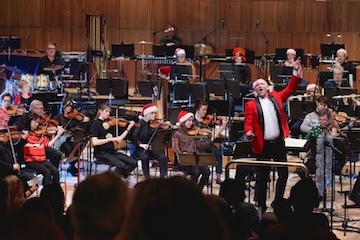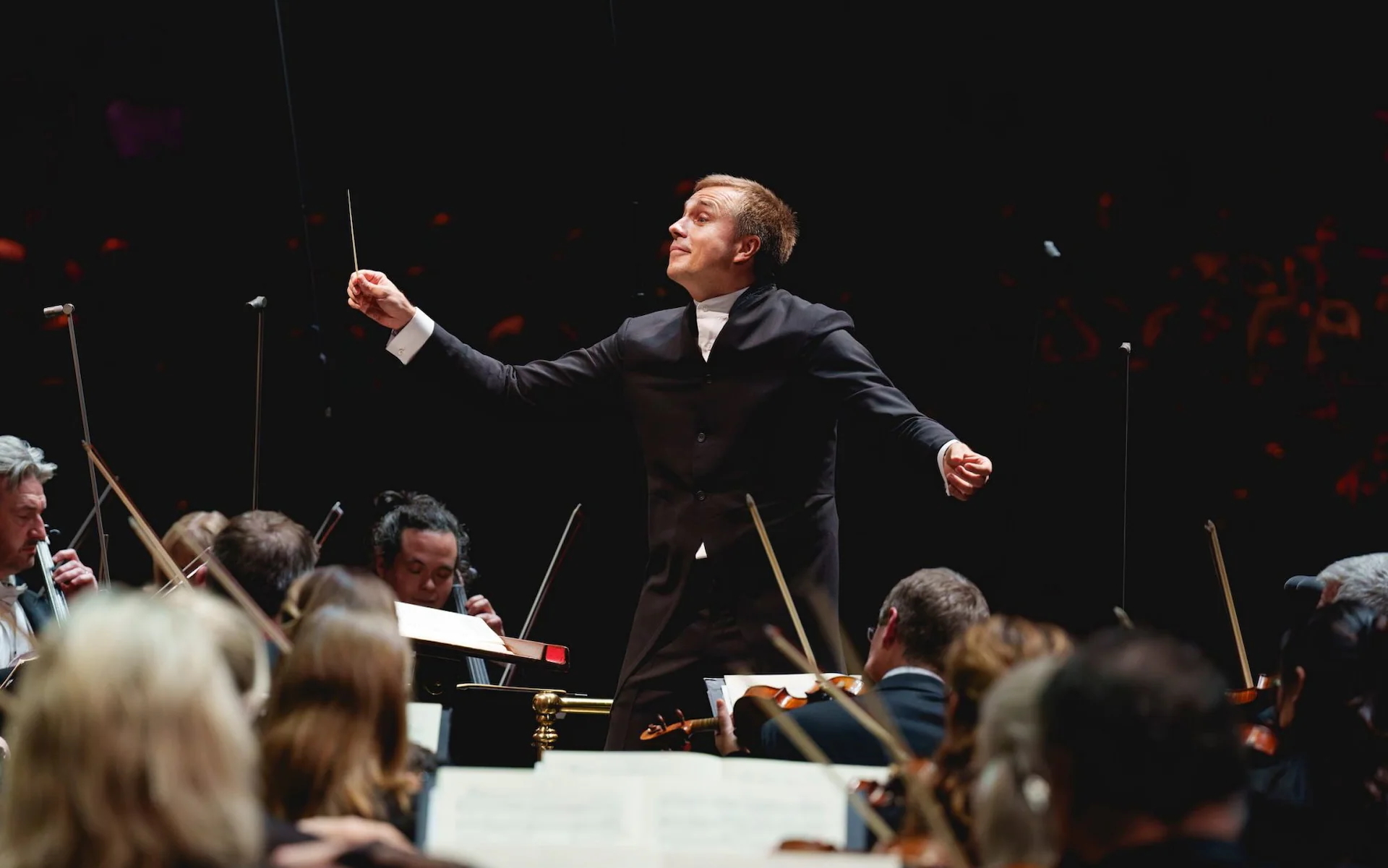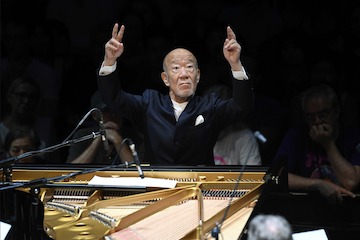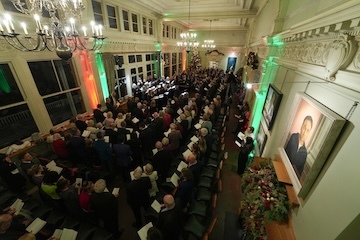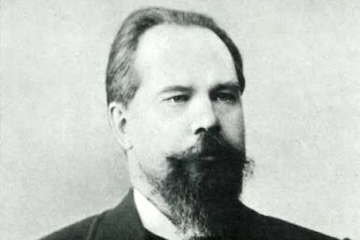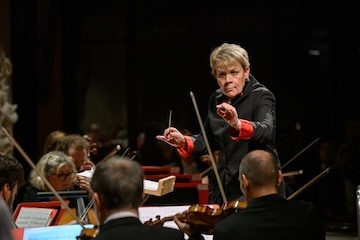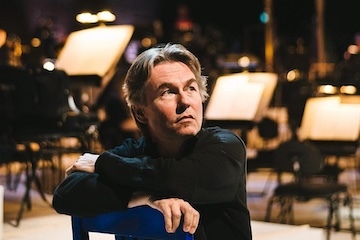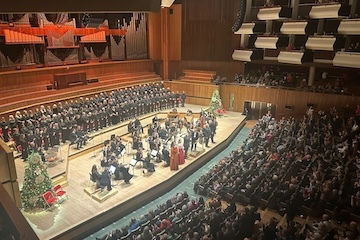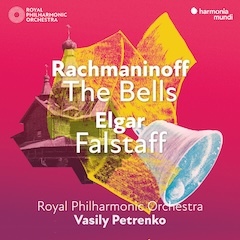
Concerts
Hildegard of Bingen - O vis aeternitatis
Mahler - Symphony No.2 'Resurrection'
Jane Archibald - soprano
Christina Bock - mezzo-soprano
Philharmonia Chorus
Chorus Master - Gavin Carr
Philharmonia Orchestra
conducted by Kent Nagano
Royal Festival Hall, London
Taneyev - John of Damascus
Philharmonia Chorus
Chorus Master - Gavin Carr
Royal Philharmonic Orchestra
conducted by Vasily Petrenko
Royal Festival Hall, London
Harry Potter and the Philosopher's Stone in Concert
Philharmonia Chorus
Chorus Master - Gavin Carr
Royal Philharmonic Concert Orchestra
conducted by Justin Freer
Royal Albert Hall, London
Harry Potter and the Philosopher's Stone in Concert
Philharmonia Chorus
Chorus Master - Gavin Carr
Royal Philharmonic Concert Orchestra
conducted by Justin Freer
Royal Albert Hall, London
Harry Potter and the Philosopher's Stone in Concert
Philharmonia Chorus
Chorus Master - Gavin Carr
Royal Philharmonic Concert Orchestra
conducted by Justin Freer
Royal Albert Hall, London
Harry Potter and the Philosopher's Stone in Concert
Philharmonia Chorus
Chorus Master - Gavin Carr
Royal Philharmonic Concert Orchestra
conducted by Justin Freer
Royal Albert Hall, London
Harry Potter and the Philosopher's Stone in Concert
Philharmonia Chorus
Chorus Master - Gavin Carr
Royal Philharmonic Concert Orchestra
conducted by Justin Freer
Royal Albert Hall, London
Recent Reviews
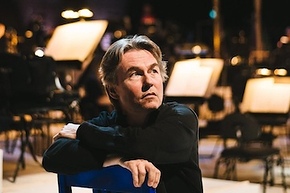
Ravel - Daphnis et Chloé - Philharmonia Orchestra conducted by Esa-Pekka Salonen
The chorus were magnificent in setting up the evocation of dawn.
David Karlin, Bachtrack, 26 February 2026
...the drama as well as the yearning erotic heat of the music came across with fabulous, ear-drenching magnificence.
Ivan Hewett, The Telegraph, 26 February 2026
The hushed opening of Act I was magical, with harps, muted horn, and flute emerging over barely audible strings. Luxuriant crescendos, including the incisive entries of the chorus, were overwhelming. The swelling
Danse religieuse was orgiastic in its abandon and there was a modern, almost jazzy swing to the youths and maidens' Danse Générale. Along the way, Salonen was an eloquent advocate for the linking sections you don't get to hear when, as is usually the case, the ballet is given incomplete. In Act III, Salonen conjured a Mediterranean warmth and an ideal balance with the chorus for the famous Lever du jour (Sunrise). A lovely flute solo for the pantomime of Pan and Syrinx followed, before players and singers rose together with an ecstatic shout of joy in the concluding Bacchanale. A truly memorable performance.
Clive Paget,
Musical America, 27 February 2026
The memorable moments were played by Samuel Coles (flute) and Rebecca Kozam (cor anglais); and not forgetting the Philharmonia Chorus who were 'ethereal-erotic' throughout: luminous
and voluptuous. However, the concluding Danse générale was just loud and brash which nevertheless was guaranteed to bring the (packed) house down: and it did with an ecstatic aplomb!
Alexander Verney-Elliott, Seen and Heard International, 27 February 2026
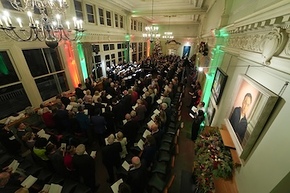
An Evening of Carols at the MCC
I launched my personal carol season at Lord's on December 1st with some absolute bangers led by the incredible Philharmonia Chorus.
Kate Mason, Metro, 19 December 2025
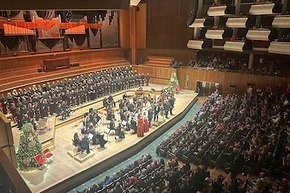
Handel - Messiah - Orchestra of the Age of Enlightenment conducted by Eamonn Dougan
There is, of course, a long tradition in this country of Christmas Messiah performances but it's not one I've ever previously participated in. This was the first time I've ever heard Messiah live, despite being quite long in the tooth, and it was terrific. I can see what I've been missing out on all these years. Handel really knew what he was doing, as do the Philharmonia Chorus, the Orchestra of the Age of Enlightenment and four excellent soloists, all under the leadership of Eamonn Dougan.
I am no expert on the scholarship behind performance practice of Messiah, although the piece is clearly robust enough to work in any number of types of presentation. What we had last night was something of a hybrid approach: small period-instrument band but large choir (numbering around a hundred). But no weighty choral-society warbling here. Eamonn Dougan encouraged a lightness of approach in his pithy, agile gestures, and the Philharmonia Chorus responded in kind, the sopranos in particular flying fluently through their many melodic runs. The final chorus saw the entire choir in glorious, summatory voice. Elsewhere, they were feisty in "He trusted in God" and generous in "wonderful counsellor" from "For unto us a child is born".
Bernard Hughes, The Arts Desk, 13 December 2025
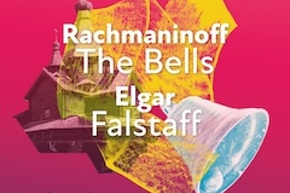
Rachmaninov - The Bells - Royal Philharmonic Orchestra conducted by Vasily Petrenko - Harmonia Mundi recording
Recording engineers Tom Lewington and Mike Hatch ensure the choir has tremendous presence, and kudos too to Gavin Carr's work as Chorus Master diction, balance, color, and tuning are exemplary. In the opening movement, we are immediately drawn in by light sparkle (mimicking sleigh bells) of the playing, and the dramatic weight of the choir's first entrance (1'48"). The reading build to a climax of refulgent colours (4'55"). Mirjam Mesak's solo in the second movement is lovely, and both she and Petrenko (who adopts a quick tempo only Rattle in Berlin/Warner Classics is faster) keep the music from becoming maudlin. Yet the performance never feels rushed, so that Rachmaninoff's luscious harmonies really depict the languid glow of love and marriage.
When I saw a timing of 8'30" for "The Loud Alarm Bells," I expected to be disappointed. Other excellent performances of this movement (Kondrashin and Rattle) are significantly faster. But Petrenko builds tension masterfully, making the percussion-laden climax (7'30") terrifying. The full-throated singing of the Philharmonia Chorus is thrillingly incisive. The final movement is again on the faster side, less dirge than anguished lament, a feeling heightened by Andril Kymach's impassioned solo. Once again, choir and orchestra build great waves of sound that make the text's grief and sorrow palpable, the gorgeous string playing in the Coda is the first signal of sadness turning to resignation and acceptance.
David A McConnell - The Classic Review, 24 November 2025
Petrenko is in his element here - and so too is the Philharmonia Chorus, particularly electrifying when unleashed at full tilt in the 'Alarm Bells' movement.
Rebecca Franks, BBC Music Magazine, December 2025
The Bells adds a 100-strong Philharmonia Chorus on peak form, coached into heavy-duty Russianness. It is Petrenko's 'loud alarum bells' that will test the resilience of your speakers. Embracing wider fluctuations of tempo and expression than Kirill Kondrashin's Melodiya classic of 1963, the dynamic onslaught is shattering.
David Gutman, The Gramophone, December 2025
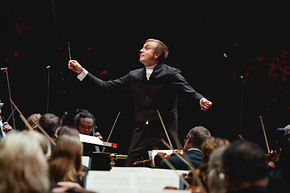
Bernstein - Chichester Psalms - Royal Philharmonic Orchestra conducted by Vasily Petrenko
Last night's concert from the Royal Philharmonic certainly drew a healthy crowd, and it had one sure-fire blockbuster in the shape of Mahler's first Symphony. But the main piece alongside it Bernstein's Chichester Psalms so often intimate and delicate in sound, unexpectedly stole the show. The combination of Broadway sassiness, neo-classical austerity and delicate inwardness can feel strained. Yet, under the sensitive direction of conductor Vasily Petrenko, it seemed a proper masterpiece.
What made it so was partly the singing of the Philharmonia Chorus. "Awake, psaltery and harp, I will rouse the dawn," says the opening lines of Psalm 108, and the chorus's fierce almost-harsh sound was exactly right for that sentiment. The orchestra was also on wonderful form. In their hands, Psalm 100 danced along like a number from a forgotten musical, the percussion and pizzicato strings touching in their irregular rhythms without over-emphasis. To call it restrained wouldn't be right because that sounds dull, and this was anything but. It was more a sense that Bernstein's dancing rhythms should always be infused with reverence, a feeling Petrenko and the performers caught beautifully.
Then came that moment in Psalm 23, when a boy treble lends a pearly innocence to the lines "The Lord is my Shepherd, I shall not want." On this occasion, treble Edward Scholes gave those lines something more, a trembling expressivity which was deeply touching. After a brief moment of anger against ungodly rulers, the piece calmed to a reflective tone, the final chorus hushed but glowing with inner heat. It was altogether wonderful.
Ivan Hewett - The Telegraph, 22 October 2025
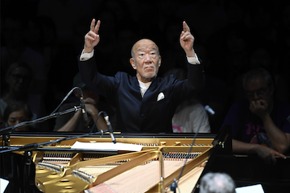
Joe Hisaishi - The End of the World - Royal Philharmonic Ochestra conducted by Joe Hisaishi
There were hints of Stravinsky, strictly atonal lyricism and big band jazz alongside symphonic landscaping that marshalled the RPO, BBC Singers and Philharmonia Chorus into sweeping waves of sound, all colourful post-minimalism topped by frothing strings.
Flora Willson, The Guardian, 15 August 2025

